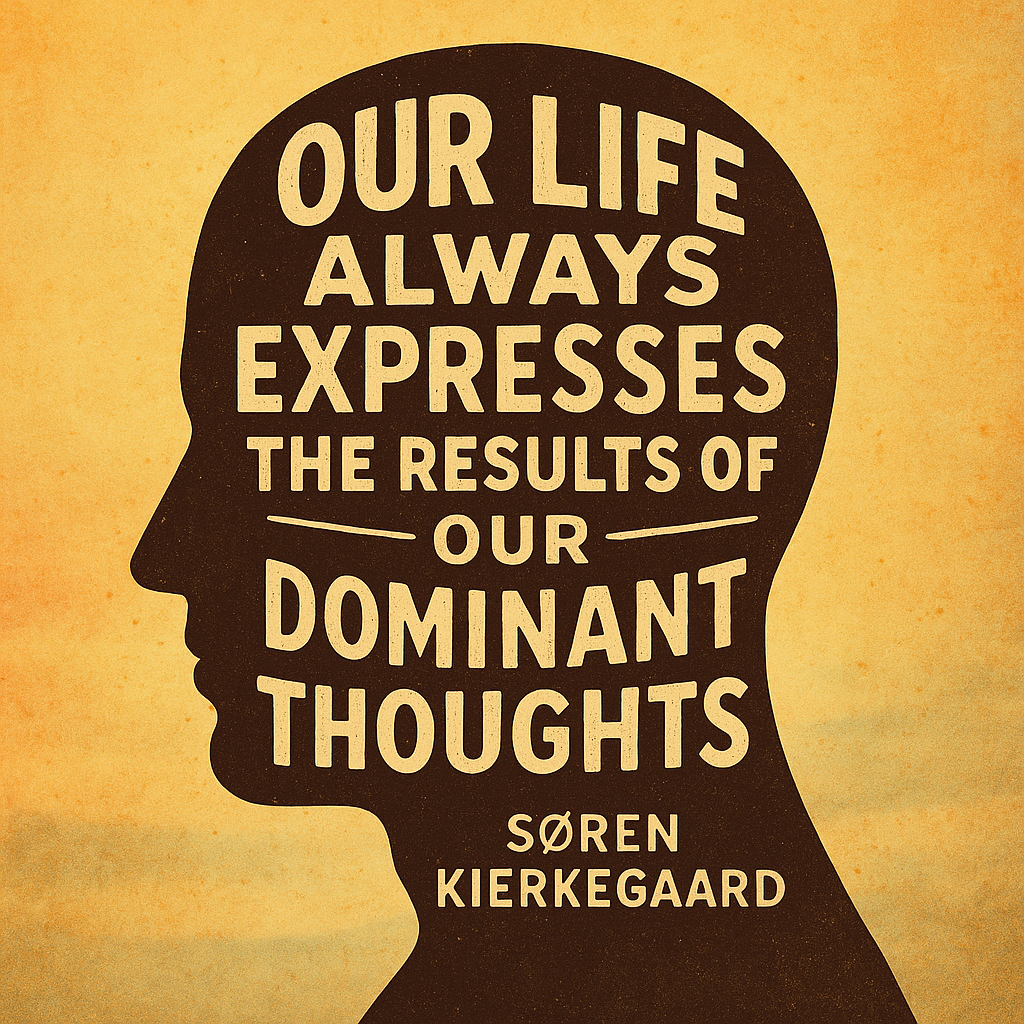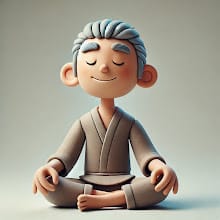The Quiet Architect: How Our Thoughts Shape the Life We Live

My wife sent me a quote the other day that I think captures the essence of the unscripted mind.
“Our life always expresses the results of our dominant thoughts.”
—Søren Kierkegaard
It stayed with me longer than I expected. There was nothing flashy about it, but it said something I didn’t want to rush past. Something that pointed to the gap between how we think life works and how it actually unfolds.
We often believe life is shaped by effort. By choices, discipline, and planning. But if we look closer, many of our decisions aren’t conscious. They come from thoughts that have been quietly shaping us for years. Beliefs we absorbed. Roles we accepted. Fears we never questioned.
This is what Kierkegaard was pointing to. Not in a mystical sense, but in a deeply practical one. If we’re not aware of what thoughts dominate our mind, we’ll keep building a life around them as if we had no choice.
Mindfulness is often reduced to being present. But there’s more. It’s the awareness of what thoughts we’ve let speak for us. The stories we’ve internalized. The assumptions we live by. Most of us don’t need new thoughts, we need to examine the ones already driving us.
That’s where the unscripted mind begins. In the pause...in the noticing. In the willingness to question what’s been silently running the show. An unlearning. Unlearning isn’t always dramatic. Sometimes it’s just the quiet recognition that a thought you’ve trusted for years doesn’t belong anymore.
For me, one of those thoughts was imposter syndrome. It showed up in subtle ways. Not just as insecurity, but as a quiet pressure to prove I was legitimate. So I studied. I searched. I tried to earn a sense of belonging. But the deeper I went into the wellness space, the books, the courses, the language, the more I saw how much of it was performance. Rituals sold as magic. Beliefs dressed as truth. Practices detached from presence.
I started to realize that most of what’s out there doesn’t require a degree, a title, or some overpriced credential. It requires honesty. Curiosity. A willingness to sit with yourself, not fix yourself. And certainly not brand yourself. That was the beginning of unlearning. Not a clean break. More like a slow, quiet disruption. A thought I had trusted, you need to prove you belong, started to feel hollow. Not because I had finally achieved something, but because I stopped agreeing with the idea that I ever had to.
That’s when things began to shift. Not by adding new beliefs, but by questioning the ones I had inherited. Most of our inner world is built from repetition, not intention. And the thoughts that repeat longest often begin to feel like reality. That’s why noticing matters.
Many of our choices are shaped by thoughts we never chose. Beliefs absorbed from culture. Expectations passed down. Ideas we’ve followed for so long, they’ve become part of the background. They don’t ask for attention. They just shape what feels normal.
Unlearning is how we begin to see clearly again. Not by upgrading our thoughts, but by asking: Do I still believe this? Sometimes the answer is no. And when it is, something begins to loosen. Not because we’ve found a better thought. But because we’ve made space for something more honest.
That’s what makes unlearning different. It’s not about fixing yourself. It’s about noticing you were never broken. Unlearning doesn’t make you less informed. It makes you more discerning. It’s not the loss of knowledge, it’s the return to something real.
And this difference, between a mindful thought and a dominant one, matters. Mindful thoughts arise in awareness. They’re not attached to identity or outcome. They show up and pass through. You notice them, but they don’t take over. Dominant thoughts don’t ask permission. They arrive with history and expectation. They shape behavior even when they’re unspoken.
That’s what makes this practice so essential. Not to become a better version of yourself. Not to polish your identity. But to become more honest about what’s been shaping you. Sometimes presence means watching your breath. Sometimes it means recognizing a thought you’ve been living by for years and deciding: I’m done giving this power.
That’s how the architecture begins to change. Quietly. From within.
This isn’t just metaphor. It’s biology. The brain is designed to adapt. When we stop rehearsing old thoughts and start paying attention differently, new neural pathways form. This is neuroplasticity, the brain’s ability to reorganize itself through new experiences and patterns of awareness.
Research shows that mindfulness can physically reshape the brain. Regular practice is linked to increased gray matter in areas related to memory, learning, and emotional regulation. These aren’t abstract changes. They reflect a real shift in how we relate to our inner world.
So when a dominant thought begins to dissolve, the structure it held in place starts to soften. Slowly, the mind becomes more spacious. Less reactive. More your own.
That’s what it means to live unscripted.
If this message resonated with you, I invite you to share it forward.
Wellness expands when we pass it on — a moment of stillness, a shift in perspective, a reminder to pause. I can’t tell you how many times someone has reached out to say, “Your message came through just when I needed it.” This is why we share. You never know whose day — or mindset — you might help shift with a single post or message.
To explore more reflections and resources, visit:
Just Breathe | Mindful Moment Blog: https://just-breathe.ghost.io
Connect with the community:
Facebook Private Group: https://www.facebook.com/groups/1764666263719665
Facebook Public Group: https://www.facebook.com/groups/476670734780310
Mindset Social: https://mindset-social.com/share/QpS3wWHwHaGcDTTz?utm_source=manual
Threads: https://www.threads.net/@justbreathe.rcl
X (formerly Twitter): https://x.com/JustBreathe_RCL
Let’s keep the conversation flowing. Let’s breathe together.
Always Remember... Just Breathe!
The Unscripted Mind

